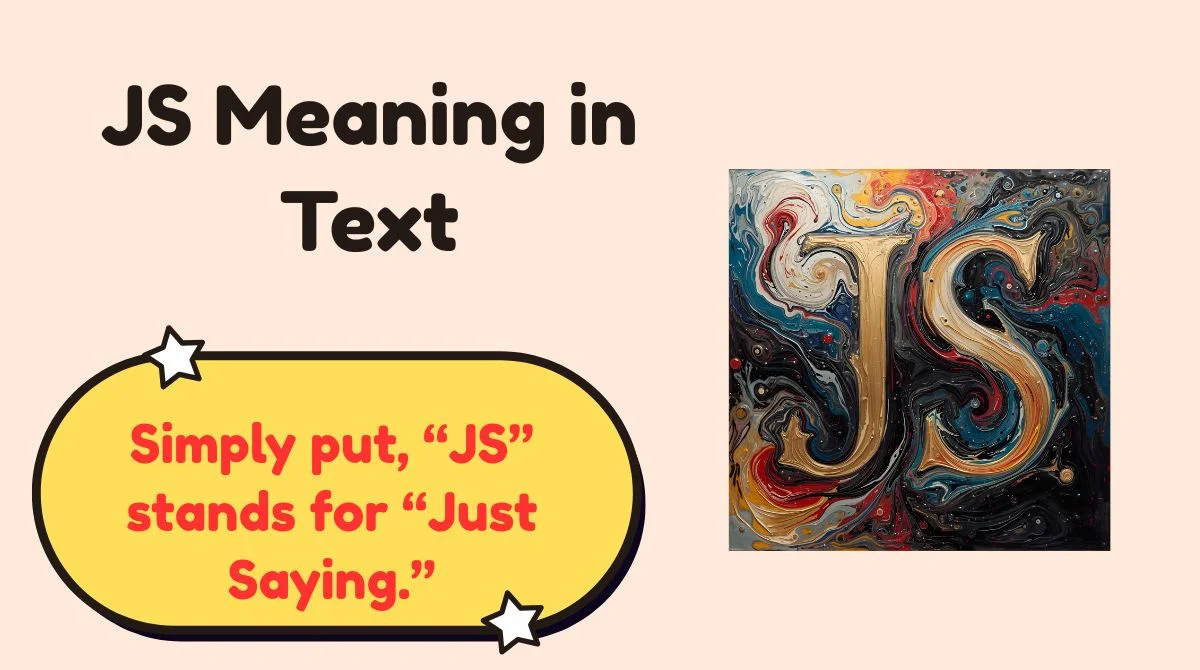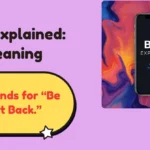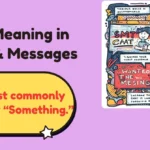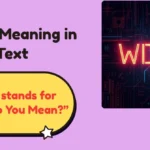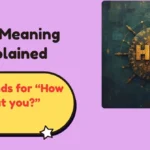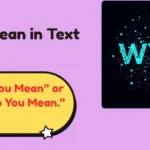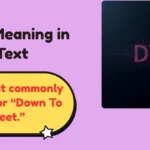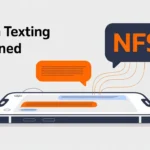Texting today feels like a language of its own. With abbreviations, emojis, and slang flooding our messages, it’s easy to get lost in translation. One of the most common—and often misunderstood—phrases is “JS.”
If you’ve ever seen someone end a message with “JS” and wondered whether they’re being honest, sarcastic, or passive-aggressive, you’re not alone.
This guide will break down what JS means in text, where it comes from, how to use it properly, and what tone it carries depending on context.
Let’s dive in. 👇
What Does “JS” Mean in Texting or Online Chats?
Simply put, “JS” stands for “Just Saying.”
It’s a quick, casual way to soften a statement that might otherwise sound blunt, critical, or overly honest. Instead of writing out the full phrase, people type “JS” to save time—and sometimes to lighten the blow of what they’re about to say.
For example:
- “That color doesn’t suit you, JS 😅”
- “Your playlist could use some variety, JS.”
Here, “JS” acts like a buffer. It’s the speaker’s way of saying, “I’m not trying to be rude—I’m just pointing it out.”
A Quick Bit of History
“Just Saying” became popular in online forums and chatrooms in the early 2000s. Over time, it was shortened to “JS” in texting, social media captions, and even work messages. Today, it’s one of the most widely used pieces of digital shorthand among Gen Z and Millennials.
Real Examples of “JS” in Conversations
Here’s a quick look at how tone and punctuation completely change the meaning of “JS.”
| Context | Example Message | Interpretation |
|---|---|---|
| Friendly | “You might want to rest, JS 😄” | Caring suggestion |
| Flirty | “You looked amazing today, JS 😉” | Playful compliment |
| Honest | “That plan didn’t work, JS.” | Constructive feedback |
| Sarcastic | “You’re always right, JS.” | Passive-aggressive tone |
| Professional | “The numbers seem inconsistent, JS.” | Gentle correction |
👉 Takeaway: The tone of “JS” depends on how it’s written and what comes before it. Emojis, punctuation, and context are key to understanding intent.
When and How to Use “JS” Naturally
“JS” works best when you want to share your opinion without sounding confrontational. It adds a touch of humility, signaling that you’re expressing a viewpoint—not declaring a fact.
✅ Best Times to Use “JS”
- When you’re offering friendly advice.
- To soften criticism or blunt truth.
- When making casual observations.
- To keep a lighthearted tone during debates.
❌ When to Avoid It
- In formal communication (emails, job messages, etc.).
- During emotionally charged conversations.
- When sincerity is more important than humor.
- If the other person might misread sarcasm.
Example:
- Good use: “You might want to double-check that link, JS.”
- Bad use: “Your work wasn’t great, JS.” (Can sound rude or dismissive.)
Tone Matters: How “JS” Can Sound Honest, Rude, or Flirty
Tone can make or break your message. The same abbreviation can carry wildly different meanings depending on punctuation, capitalization, and emoji use.
Here’s a breakdown of how tone changes perception:
| Tone | Example | Emotion Conveyed |
|---|---|---|
| Honest | “You’re improving, JS.” | Supportive honesty |
| Rude | “That’s not how it’s done, JS.” | Dismissive |
| Playful | “You looked cute today, JS 😜” | Flirty |
| Sarcastic | “Oh sure, like you’re an expert, JS.” | Teasing irony |
| Lighthearted | “That’s a bold choice, JS 😂” | Friendly humor |
💡 Tip: Avoid all caps (“JS”) if you don’t want to sound harsh. Lowercase (“js”) feels more relaxed and casual.
Polite, Professional, and Casual Alternatives to “JS”
Sometimes, you want to express the same thought without using slang. Depending on your audience, here are better ways to phrase it:
Polite Alternatives
- “Just my opinion.”
- “No offense intended.”
- “Take this as friendly advice.”
- “I mean this kindly.”
Professional Alternatives
- “For your consideration.”
- “In my view…”
- “May I suggest…”
- “It might help to…”
Casual Alternatives
- “Tbh” (to be honest)
- “Lowkey” (subtle truth)
- “No cap” (no lie)
- “Fr” (for real)
👉 Using the right alternative ensures your tone matches the situation—whether it’s texting a coworker or chatting with friends.
12 Best Replies to “JS” (Smart, Funny, and Confident)
So, someone just ended their message with “JS.” How do you respond?
Here are 12 natural and creative replies you can use—depending on your mood and the tone of the conversation.
- “Fair enough.” — Shows maturity and acceptance.
- “Appreciate your honesty.” — Keeps it calm and respectful.
- “Good point, noted.” — Polished and professional.
- “Was that shade or truth? 😅” — Adds humor without hostility.
- “I’ll take that as feedback.” — Confident and composed.
- “You’re not wrong, JS too.” — Witty and clever.
- “Thanks for saying it.” — Shows grace and gratitude.
- “You’re bold for that one 😂.” — Playful banter.
- “I get what you’re saying.” — Balanced understanding.
- “Alright, you got me.” — Lighthearted surrender.
- “Can’t argue with facts.” — Confident humor.
- “Duly noted, moving on.” — Assertive and direct.
💬 Pro Tip: Always match their tone. A sarcastic “JS” deserves humor, while a genuine one deserves empathy.
Cultural and Generational Context Behind “JS”
The meaning of “JS” shifts across generations and digital spaces.
Among Gen Z
- Often used humorously or ironically.
- Appears in TikTok captions, tweets, or memes.
- Usually paired with emojis or lowercase for a laid-back vibe.
- Example: “that outfit kinda slaps, js 😭🔥”
Among Millennials
- Used more sincerely to soften feedback or express an opinion.
- Example: “You might want to rethink that strategy, JS.”
Online Community Use
- Twitter/X: Often sarcastic.
- Reddit: Analytical and neutral.
- Instagram/TikTok: Playful or flirty.
Case Study:
A 2024 survey by a digital linguistics forum found that 67% of users aged 18–30 interpret “JS” as “light sarcasm,” while older users (30–45) view it as a “soft honesty signal.” This shows how slang evolves with culture and platform context.
When NOT to Use “JS”
Even though it’s versatile, “JS” can backfire when used in the wrong setting. Here’s when to skip it:
1. Formal or Workplace Settings
- Using slang in a professional email can seem unprofessional.
- ❌ “The proposal needs more detail, JS.”
- ✅ “The proposal could use more data support.”
2. Sensitive Conversations
- When emotions run high, clarity and empathy matter more than brevity.
- Example: Avoid “JS” after giving criticism or emotional feedback.
3. With Strangers or Superiors
- Without context or established tone, “JS” might sound dismissive or rude.
4. When It Feels Like a Defense
- If you use “JS” after every blunt remark, it can feel like an excuse.
- “You’re being dramatic, JS.” sounds like hiding behind the abbreviation.
How “JS” Reflects Modern Digital Communication
In the bigger picture, “JS” is part of a growing wave of digital diplomacy—a way people express truth while softening the edges.
It reflects our desire to be authentic yet kind. We live in an era of constant messaging where tone can easily be lost, and abbreviations like “JS,” “IMO,” or “FWIW” help strike that delicate balance.
“Language is not just about what we say, but how we make others feel.”
— Linguist Deborah Tannen
Think of “JS” as a linguistic cushion. It lets people speak up without escalating tension—a skill essential in fast, text-based communication.
Clear Communication: The Secret Ingredient in Digital Respect
It’s easy to forget that text lacks tone and facial expression. Misunderstandings happen when words seem harsher than intended.
Here are a few ways to keep your communication clear while still being real:
Practical Tips
- Add emojis to signal warmth or humor.
- Avoid all-caps unless emphasizing.
- Use line breaks for better readability.
- Choose honesty, but frame it kindly.
Mini Case Example
Before: “That idea won’t work, JS.”
After: “That might not work as planned 😅 just saying.”
See the difference? The second feels friendly and constructive.
Moral: Clarity beats cleverness. Always prioritize connection over coolness.
Final Thoughts 😉
At its core, “JS” means “Just Saying”—but it’s more than that. It’s a window into how we balance honesty and tact in the digital age.
Used well, it can make your texts sound playful, genuine, or thoughtful. Misused, it can come across as passive-aggressive or dismissive.
So next time you type “JS,” ask yourself:
Am I expressing truth or hiding behind it?
A little self-awareness goes a long way in building digital respect and authentic communication.
JS 😉
FAQs About JS Meaning in Text
What does JS mean on social media?
“JS” means “Just Saying.” It’s a shorthand used to express opinions or comments casually without sounding too direct.
Is JS the same as TBH?
Not exactly. “TBH” means “to be honest,” while “JS” softens the statement—it’s more about sharing an opinion rather than emphasizing truth.
Can I use JS in a work email?
Avoid it in professional emails. It’s informal and may seem unprofessional. Instead, use phrases like “for your consideration” or “in my view.”
Is JS rude or sarcastic?
It depends on tone and context. With humor or emojis, it sounds light. Without them, it can appear passive-aggressive.
How do I reply to someone who says JS?
Stay cool. Acknowledge politely or respond playfully, like “Fair point” or “Appreciate your honesty.”
